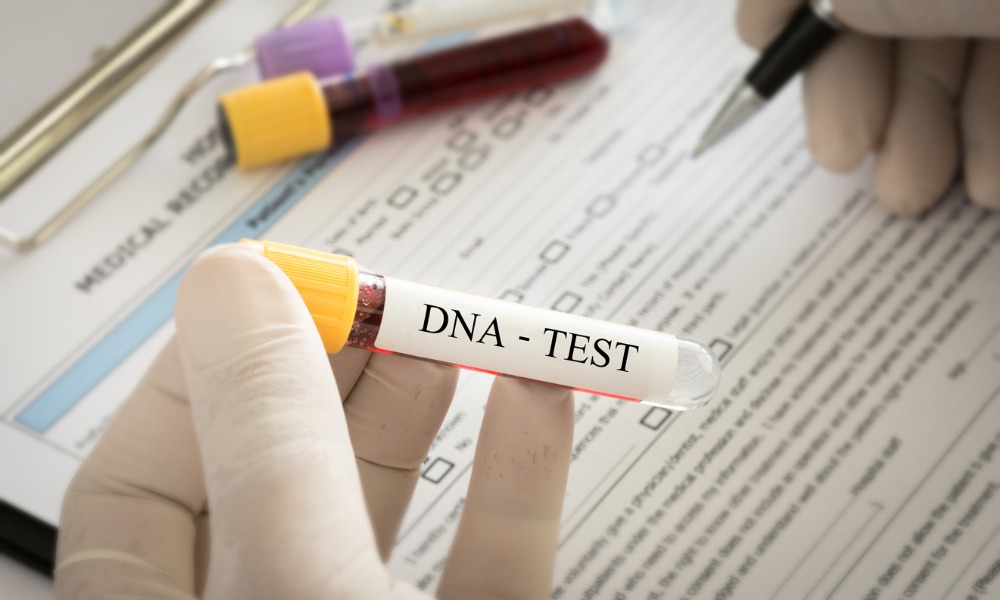
The case involves allegedly fraudulent DNA test results where man questioned paternity

The Alberta Court of King's Bench has ordered a case to proceed to trial where a man is seeking to recover 19 years of child support payments after he questioned the accuracy of a DNA test.
In Unger v Scott, 2023 ABKB 500, Dedra Scott and Byron Unger were involved in a brief relationship in 2001 that resulted in a pregnancy. In August 2002, their daughter was born. However, there were questions about the child's paternity, as Scott was also involved with her ex-boyfriend, Kerry Shakura, around the time of conception. In October 2002, Scott requested child support from Unger.
A pre-natal DNA test was conducted in 2002 with the genetic material of Scott and Shakura. The test result indicated a zero percent chance that Shakura was the biological father. Scott maintained that Unger was the father based on the test results but allegedly did not provide Unger with a copy of the report until 2020.
Unger, who continued to pay child support over the years, expressed doubts about the child's paternity. From time to time, over the years, Scott invited Unger to get his DNA testing while adamantly insisting he was the father. Unger did not do any testing. He expressed frustration with his limited access to the daughter and indicated the reason for his reluctance to insist on testing was his concern it would lead to Scott further restricting his access. He also expressed concerns about potential significant costs if lawyers become involved.
In January 2020, the court increased child support to $3,000 from the previously agreed-upon $2,000. Subsequently, Unger requested a DNA test, the result of which showed a zero percent probability that Unger was the biological father. In July 2020, another paternity test report found that the likelihood of Shakura being the biological father was virtually 100 percent.
Unger obtained an expert report from a forensic biologist comparing the DNA reports that concluded that the donor of the putative father's sample in 2002 and Shakura's sample in 2020 could not have come from the same person.
Unger sued Scott to recover approximately $400,000 in child support payments made over the years. Scott sought a summary dismissal of the claim, arguing that it is barred by the Limitations Act, particularly under the ten-year ultimate limitation period. The initial payment for child support was made in 2002 and continued for approximately 19 years. However, the court noted that if Scott fraudulently concealed the fact that the 2002 DNA test was incorrect or false, the claim would not necessarily be statute-barred.
Scott argued that the test for assessing fraudulent concealment in a limitations context has three elements – the defendant's perpetration of fraud, the concealment of a material fact, and the plaintiff's exercise of reasonable diligence to discover the fraud.
Scott maintained that she relied in good faith on the 2002 DNA test and believed Unger was the biological father. Scott further argued that the evidence showed that Unger had doubts and could have had further DNA testing at any time if he had been reasonably diligent.
While the court found Scott's argument compelling, the court also noted that the expert evidence concluded that the DNA material submitted in 2002 could not have come from Shakera and probably not from Scott. Additionally, there was a dispute over the application of the Limitations Act. Unger argued that since each child support payment is part of a continuous course of conduct, the limitation period only starts when the last payment was made. On the other hand, Scott suggested that each payment constituted a separate claim.
Given the complexity of the case and the disputed facts and legal principles, the court decided not to grant a summary dismissal at this stage. Instead, the Alberta Court of King's Bench ordered the case to proceed to a full trial where the parties could present their evidence and arguments to determine whether Scott's conduct amounted to fraudulent concealment and how the limitations act applied in this context.